
Italian postcard by Edizioni Beatrice D'Este, no. 20 162. Photo: Robert De Niro in Taxi Driver (Martin Scorsese, 1976).
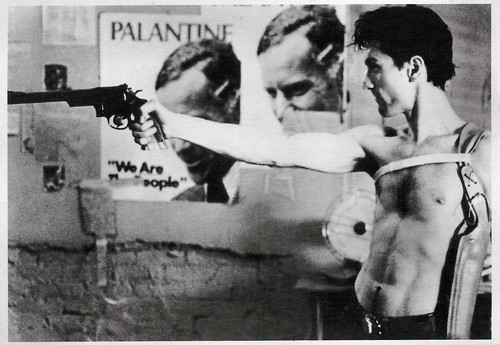
Canadian postcard by Canadian Postcard, no. A-5. Robert de Niro in Taxi Driver (Martin Scorsese, 1976).
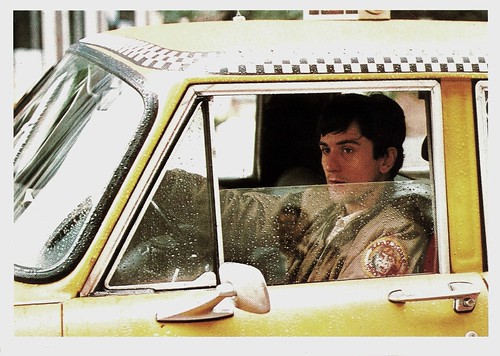
French postcard in the Collection Cinema Couleur by Editions La Malibran, Paris, no. MC 33, 1990. Photo: Robert De Niro in Taxi Driver (Martin Scorsese, 1976).
Someday a real rain will come and wash all this scum off the streets
Robert De Niro is Travis Bickle, a frustrated 26-year-old war veteran, who recently quit the Marines. He suffers from insomnia and therefore takes a job as a taxi driver in New York, and does not mind working at night. In his spare time, Bickle watches porn movies in cinemas and drives around aimlessly in the bad neighbourhoods of Manhattan.
Horrified by the disappearance of any sense of value, Bickle says: "All the animals come out at night - whores, skunk pussies, buggers, queens, fairies, dopers, junkies, sick, venal. Someday a real rain will come and wash all this scum off the streets." When one night Iris, a 12-year-old prostitute (played by Jodie Foster), accidentally ends up in his taxi as she tries to escape from her pimp, he is deeply moved. He wants to try and save her even though Iris is not keen on that at all. About her pimp, Sport (Harvey Keitel), she says that he is actually a very kind and caring person.
Bickle also suffers from his failed attempt to form a relationship with Betsy (Cybill Shepherd). Betsy works for a New York State senator called Palantine, who is campaigning for the presidential nomination. Palantine promises drastic social changes. At the beginning of their relationship, Betsy is intrigued by Bickle. First Bickle takes her out to lunch, during which he flirts with her and sympathises with her loneliness. He becomes obsessed with her. Eventually, they make a date to go to the movies. Bickle takes her to see an educational Swedish sex film, and Betsy leaves in disgust. After this incident, he believes he has to do whatever he needs to make the world a better place - in his opinion.
After that, Bickle becomes increasingly self-absorbed. He buys a knife and four pistols. During one of his trips, a businessman (a small role by Martin Scorsese himself) explains to him how he wants to kill his wife for cheating. When he is getting groceries at a shop he frequently visits, there is a robbery, and Bickle shoots the robber. Bickle writes a letter to his parents, saying that he is engaged in very important and secret government work. He also tells them about Betsy. Bickle has plans to assassinate Senator Palantine.
Bickle has devised all sorts of methods by which he can hide his pistols and bring them out quickly. Famous is the scene in which Bickle stands in front of a mirror, practising the speech he wants to give when he is confronted with someone who wants to stop him during his attack. Bickle: "You talkin' to me? You talkin' to me? ... Oh, yeah? Ok.", after which he draws his weapon. Bickle then attempts to kill Senator Palantine during one of his public campaign speeches. However, he is spotted by someone from the Secret Service. (Bickle had struck up a conversation with the Secret Service agent sometime earlier, inquiring about ways to join the service). After the Secret Service sees through him, he flees, and then goes off to Iris' pimp and tries to kill him. Then, in the same building, he tries to take Iris away from a customer. A gunfight between Sport and his cronies against Bickle ensues, in which only Iris and Bickle survive.
When the police arrive at the building where all this took place, Bickle is sitting wounded on a bench. He looks as if he is dying. When he sees the police, he puts his index finger to his head and pretends to shoot himself. The media write about Bickle as if he were a hero. He also receives a letter from Iris's father and reads that her father is very grateful to him for saving his daughter; she is out of prostitution, living at home again, and going back to school. When Bickle resumes his job as a taxi driver, Betsy comes into his taxi one evening. She makes remarks about saving Iris and his fame through the media. Bickle does not respond, and it seems as if he does not think he is a hero. Even now, so many decades later, there is debate about the ending of this film.
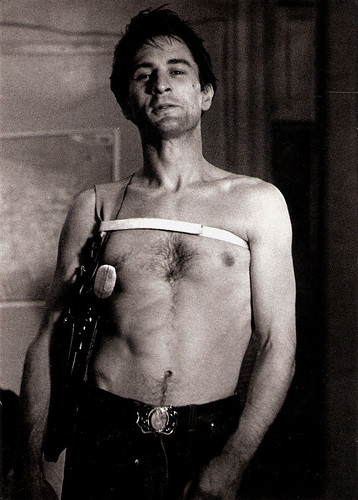
Belgian promotion card by Tasschen Gallery for the exhibition 'Taxi Driver - unseen photographs from Scorsese's Masterpiece'. Photo: Steve Schapiro. Robert De Niro in Taxi Driver (Martin Scorsese, 1976).

British postcard by Music & Movie Stars Ltd. Publishers, no. MMS 036. Jodie Foster in Taxi Driver (Martin Scorsese, 1976).
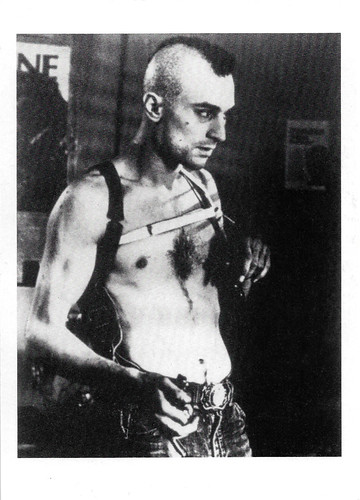
British postcard by Palm Pictures, no. C 20. Robert de Niro in Taxi Driver (Martin Scorsese, 1976).
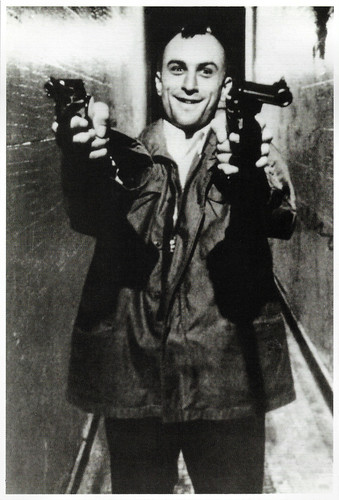
Vintage postcard. Robert de Niro in Taxi Driver (Martin Scorsese, 1976).
Are you talking to me?
During the preparation of the film, Robert De Niro worked several weekends as a real taxi driver in New York. During this period, filming took place for the Italian film Novecento/1900 (Bernardo Bertolucci, 1976), in which he played a leading role, and De Niro flew back and forth between Rome and New York to do this. Taxi Driver (1976) is told from Bickle's point of view. However, one scene has been added that (partially) breaks with this structure, namely the dance scene between Sport and Iris. In order to restore the structure, a shot of Bickle has been added, in which it can be seen that he is standing outside the building and looking at the room where Sport and Iris are.
The shots in the taxi were shot in a taxi that was actually driving around the city. This meant that the camera was placed in the taxi along with Martin Scorsese, cameraman Michael Chapman, the actors and a soundman in the back. Scorsese wanted to make these scenes in the taxi as realistic as possible, with New York as the backdrop: "the city almost as a character." The steam through which the taxi drives in the opening shot is symbolic of hell, to reflect the dangerous, dark atmosphere of the ghetto.
Much of the dialogue in the film is a combination of the script by Paul Schrader and improvisation sessions during the preparations. For example, the famous scene in which Bickle stands in front of the mirror and talks to himself ('Are you talking to me?') was created by improvisation. The character Sport (Harvey Keitel) was fleshed out through improvisation. Originally, this role would not have much dialogue (five lines total), but Keitel chose to flesh it out further. A good example of this is the scene in which Travis Bickle enters into a conversation with Sport, and at the beginning of the encounter, Sport thinks that Bickle is someone from the police. The expansion and improvisation of this role were always done in collaboration with Martin Scorsese, bearing in mind that it was important to guard the basis of the script and not to deviate too far from it.
Author Paul Schrader got the inspiration for the script when he had no place to stay for a while after his marriage and a subsequent relationship broke up. He wandered around and realised that he had not spoken to anyone for weeks and had been living in isolation. This gave him the idea of using the taxi as a metaphor for loneliness. He then wrote the script in just ten days. "I wrote the script for myself, as therapy."
Schrader wrote the script with the idea of the two women, Betsy (Cybill Shepherd) and Iris (Jodie Foster) as beacons of good and beauty. Betsy as Madonna, Iris as whore. Bickle's statement "I'm God's Lonely Man" refers to the essay "God's Lonely Man" by Thomas Wolfe, a writer who died in 1938. In this book, Wolfe writes: "The whole conviction of my life now rests upon the belief that loneliness, far from being a rare and curious phenomenon, is the central and inevitable fact of human existence".

British postcard by Memory Card, no. 530. Jodie Foster and Robert de Niro in Taxi Driver (Martin Scorsese, 1976).

British postcard by Memory Card, no. 531. Robert de Niro in Taxi Driver (Martin Scorsese, 1976).
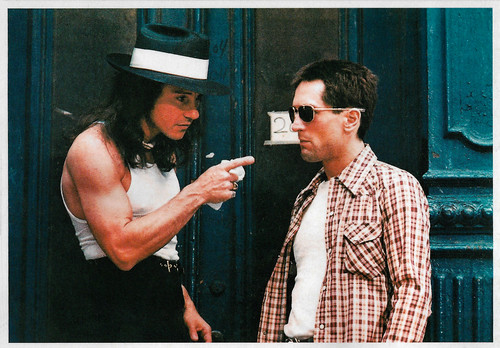
British postcard by Memory Card, no. 532. Harvey Keitel and Robert de Niro in Taxi Driver (Martin Scorsese, 1976).
Sources: Wikipedia (Dutch) and IMDb.
No comments:
Post a Comment